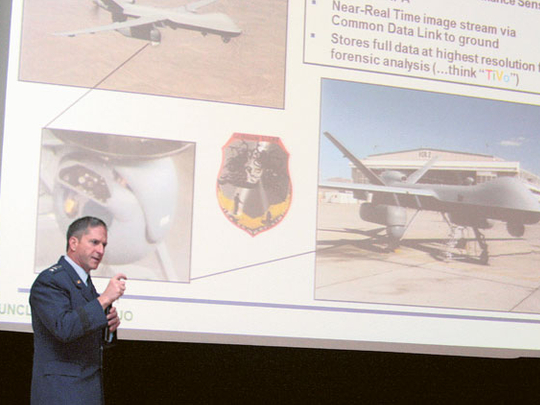
Abu Dhabi: The Middle East "is a dynamic region and its regional stability is very important for the United States and the rest of the world," Lieutenant General David L. Goldfein, commander of the US Air Forces Central Command, has said.
Addressing tensions with Iran, Goldfein said the options of diplomacy and political talks were still on the table but refused to rule out military action against the Islamic republic should these fail.
"We should have global vigilance and unblinking eyes. We look forward to seeing all lines of communication open. Our job is diplomatic; yet if the [Iranians] do not respect universal rules, we are always prepared," he said.
Speaking to the Gulf News after the Middle East Intelligence, Surveillance and Reconnaissance Conference (MEISR), which was held in Abu Dhabi on Sunday, Goldfein said the United States enjoys very strong and distinguished relationships with the countries in the region.
Strategic partnership
He added that "we are mindful of the dangers in the region since we have been based in the GCC, particularly in Bahrain, since 1948. We continue to establish this enduring strategic partnership."
David Deptula, Lieutenant General (retired) of the USAF and chief executive officer of Mav6, urged the Iranians not to close the Hormuz Strait as this would affect many other countries apart from the United States.
"Any action by [the] Iranians to close the Strait of Hormuz is not in favour of any country. It is not in the [interests] of the Iranians to exacerbate the situation in the region. This will have negative impacts on the Iranian people, government and regime," Deptula said.
"Any kind of threat or hostile action that would affect the flow of commodities and goods would not be very helpful and we are working hard to maintain peace and stability in the region," he added.
Deptula voiced hope that diplomatic missions and endeavours would help resolve the current status quo without the need to resort to military action against the Islamic republic.
Riad Kahwaji, CEO of Institute for Near East & Gulf Military Analysis (Inegma), told Gulf News that the GCC countries "would be pushed to war if war was launched in the region against Iran and that the Iranian reaction would be targeting the GCC countries and their infrastructure".
He, however, pointed out that GCC countries were better equipped, militarily, than the Iranians and could count on US support.
Kahwaji added that Iran is currently under heavy diplomatic and economic sanctions which have already started to bear fruits.
"Yet, Iran is bearing in mind such Western moves and future actions, and it would resort to preventive attacks in the region."
Kahwaji said Israel, acting alone or in unison with the United States, would take the first step in attacking Iran — given the sophisticated weaponry at the disposal of the two allies.
Engaging Iraq
With regard to Iraq, following the withdrawal of the US troops in December, Goldfein said: "We are still engaged with the Iraqi government in terms of military cooperation under the umbrella of diplomatic efforts."
Mowaffak Al Rubaie, former National Security Adviser and Iraqi lawmaker, told Gulf News that the pullout of the US forces "is not a problem for the Iraqis as... Iraqi forces are much suited to act against terrorism."
Al Rubaiei added: "There is no territorial threat for our country. Iraq has developed very good security forces with the help of the US. However, we need to regain our sovereignty and full control on the Iraqi land. That is why we asked the US to leave."












